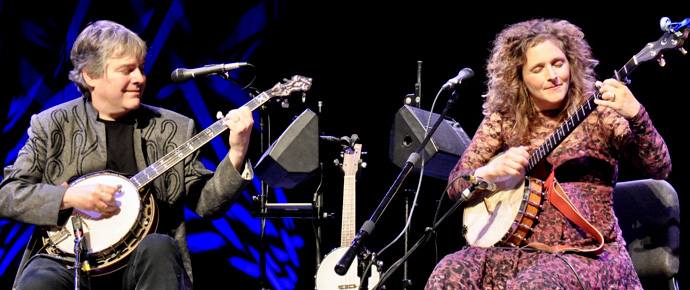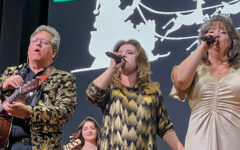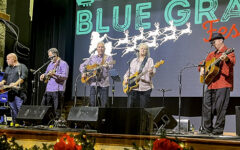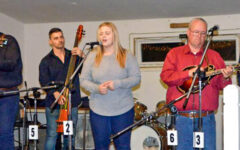
Béla Fleck and Abigail Washburn at the Tennessee Theater (March 24, 2018) – photo by Alisa B. Cherry
It’s one thing to start your set on time. It’s quite another to begin before you’re even due onstage. By that measure then, Béla Fleck is an overachiever. His performance with wife Abigail Washburn started solo, and several minutes before he was due to open up. The early arrival was prompted by a talk about current affairs and race relations from Rhiannon Giddens that took place this past Saturday at Knoxville Tennessee’s eclectic Big Ears Festival.
In other circumstances, a concert at the historic and stately Tennessee Theater would be enough to make Fleck and Washburn’s appearance there worth noting. In this case however, it was clear from the start that this would be some kind of a singular show.
And so it began as Fleck plucked away at his banjo on an inspired tune called Come All You Coal Miners (written, it was explained, by the wife and daughter of a Kentucky coal miner). Washburn then joined him onstage, appearing several months’ pregnant under her elaborate peasant dress and eager to join in. For their first song together, a politically charged ballad called Over the Divide — one which referenced the Syrian refugee crisis — they also made it clear that social issues wouldn’t stray far from their mindset. And yet even in such solemn circumstance, there was humor too. After claiming to have learned the song from an Austrian sheepherder whose parents survived the Holocaust, Washburn remarked, “He made us listen to his yodelling. But because he was a Jewish sheepherder, he yodelled in Yiddish.”
That combination of lighthearted banter and serious intent informed the duo’s entire hour and a half onstage. “I’m real pregnant,” Washburn admitted as she affirmed the obvious. As if to drive the point home she noted that her old-fashioned claw hammer banjo was hollow in the back, creating what she described as a shield for the baby in her belly. Nevertheless, she showed that her condition wouldn’t handicap her performance. At one point, she got up from her chair and tap danced, drawing appreciative applause from the crowd in return.
So too, the two musicians were always in perfect sync, whether playing their endless supply of instruments or offering up some occasional harmonies. Drawing mainly from the song selection that graced their latest album Echo in the Valley, as well as an occasional tune from Fleck’s Flecktones, they shared their traditional trappings within a festival setting that mostly highlighted forward-looking music of a more progressive posture.
Regardless of their choice of instruments at any given time — and there was an arsenal to choose from — Fleck and Washburn were always in sync. Her role was mostly to pluck out the melodies clawhammer style while he ran up a dizzying flurry of notes up ad down the frets. It was dazzling at times, but always harmonious as well. Admittedly, the most satisfaction, at least as far as the crowd was concerned, came from the more familiar tunes the pair shared — If I Could Talk to a Younger Me, Don’t Let It Bring Me Down, and Take Me to Harlan on the aforementioned new album, and a revamped version of the vintage folk tune I’ve Been Working on the Railroad (with the phrase “Dinah, won’t you blow your horn” prominently inserted as well)” that showed their homage to past precedent. On that score, Fleck proudly showed off a banjo he purchased at a sale conducted by the estate of the late Earl Scruggs, and then proceeded to point out where the late great master had etched his name in the back.
While bluegrass naturally figured prominently in their set, the two did step out of their element as well. Twice during the set,they brought out the string quartet Brooklyn Rider, with whom Fleck had performed at other times during the festival. The combination of the group’s cello and violins, Washburn’s vocals, and Fleck’s astute lead lines made for a joyful combination on songs such as And Am I Born to Die and Bloomin’ Rose, each offering the group a brief but much appreciated cameo. Likewise, Fleck and Washburn’s versatility was clearly the constant.
In the midst of that astute instrumentation, the duo also took a few moments for mirth. “Does anyone wonder how the two of us got together?” Fleck asked the audience. When no one in the crowd appeared to respond, he joked, “Nobody cares, but if you had asked, here’s how it happened.” He then launched into a tale about their courtship that originated with a site called Banjomingle.com, presumably a musician’s equivalent of Match.com. Like most dating sites, it apparently offered the two opportunity to share their likes and dislikes, albeit in ways only musicians can appreciate. They had the crowd in stitches, and though it became increasingly clear that the website doesn’t in fact exist, their shared narrative was amusing and engaging regardless.
“That’s the beauty of Big Ears,” Fleck remarked as the set drew to a close. “You’re free to do what you want even when you don’t know what you’re going to do.” Even in an environment where 12 hour drones and the most mystifying match-ups seem to be the rule, Fleck and Washburn can claim credit for a seemingly spontaneous set of their own.







